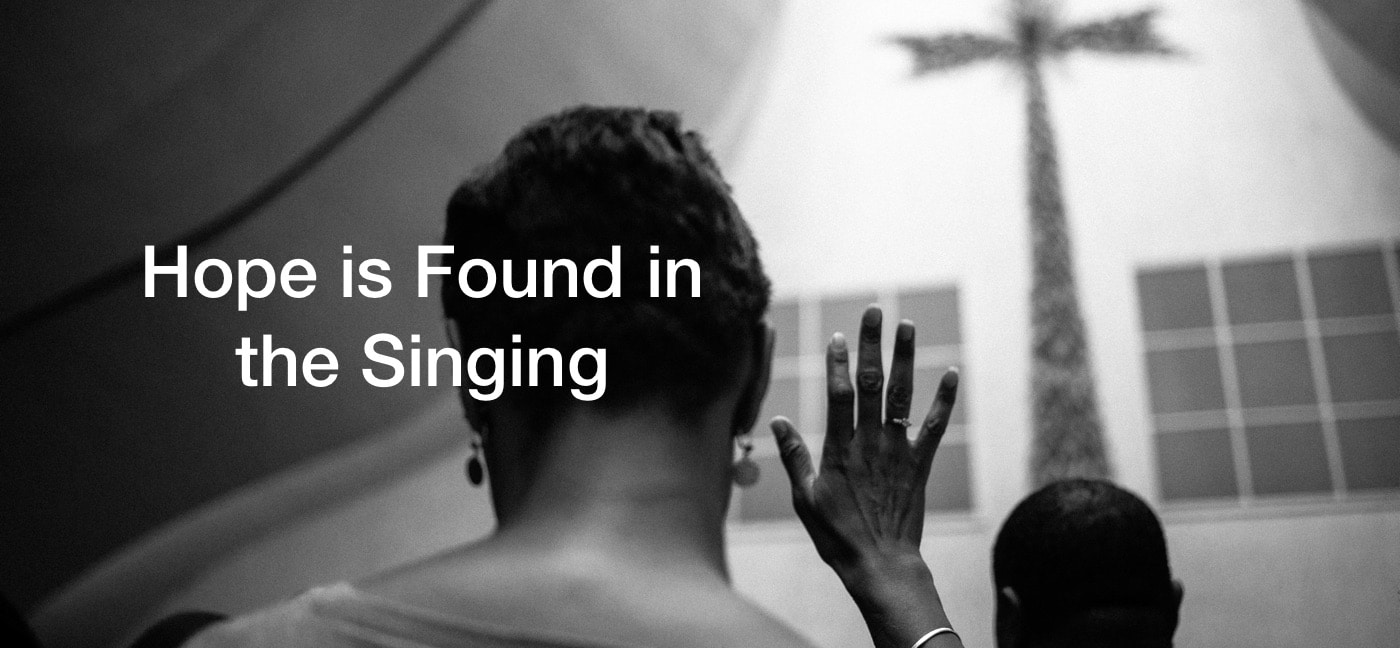Hope is Found in the Singing

When I was a little girl, our Christian church had a 15-20 minute testimony and devotion service before all other services. Mostly attended by older Saints, it was a time for them to sing a verse from a song, read a scripture passage that helped them get through the week, or testify of God’s goodness. Whenever my mother had to work, my grandmother took me along, so I spent a great deal of my childhood witnessing testimony and devotion services. The old beloved names I still recall. I heard Deacon Tommy Jackson and Deacon Jimmy Diggs line hymns, a vocal tradition held sacred in Black church spaces. I listened as Mother Mozelle Booker recounted the ways God kept her through all of life’s trials and tribulations.
Through my young eyes I watched with amazement each and every time someone rose to tell how, after all they’d been through, they still had a reason to praise God. It was in those testimony services that I learned the chorus to what would become my favorite hymn:
- Farther along, we’ll know all about it.
- Farther along, we’ll understand why
- Cheer up, my brother- live in the sunshine.
- We’ll understand it all by and by.
Before I fully understood what it meant to be Black in this world, I understood why my elders sang that song with such intention and expectation. The prophetic legacy of testimony and devotion service in Black churches created room for Black people to grieve their experiences in the present and look to the hope of deliverance in the future. There was something honest about expressing that certain things — the heartaches and pains of this life — didn’t make sense at the time but, if they just kept on living, it would all make sense.
Singing songs of hope, believing in hope itself, has always had double meaning for Black people. Grief has always been layered and duplicitous. The horrors of systemic racism and inequality have brought many to the altar, crying out to God. When I watched people pray for financial miracles, it wasn’t because they mismanaged money. It was because doubly high unemployment rates, along with discriminatory and predatory loan practices, had taken residence in their homes. When I watched Black mothers cry out for their sons in prayer, I knew that poor legislation and over-policing in our communities made such petitions to God more frequent than those from their White counterparts. And, at the same time, I saw people rocking and moaning and wiping away tears as they recalled having to bury loved ones. I heard the wails that come with processing grief, broken hearts, and loneliness. And I understood the fervor it took to believe that the same God who brought you through dark times before would lead you back into the light, again.
I was a child, soaking in wisdom that I did not fully appreciate but knew I would one day need. Then, I found myself in a season where finding a reason to praise God proved extremely difficult. During the span of three years, it seemed that every tragedy that could have happened to me did. I can scarcely convey the whole of it. There were days when even waking up proved to be a chore as I feared what deep sadness the next 24 hours would bring. In some of my darkest times, I remembered the songs I heard during those testimony and devotion services and sang them to myself. I remembered the scriptures that were consistently raised as comfort in hard times and read them. I remembered the faces of every older believer who took their time, finding whatever strength they could muster, to stand and declare with full voice that God sustains God’s children.
Faith is a mystery. It doesn’t make sense to believe. The way we can recall a time when we thought we wouldn’t make it and then see how God carried us is beyond human understanding. There are pains in this life that cannot be fully understood and articulated. And yet, there is a God who abides with us in the midst of that pain, never asking us to make sense of it, but only to trust that God will never leave our side.
We are able to endure suffering and despair because we are never far from a loving Creator who understands that these pains require nurture and comfort. We make it through because, in the darkness of it all, God sits with us and holds our hand. There are many things that I do not understand. I have questions, and the fear that answers may never come can be daunting. But then I remember the words of the song that I learned to cherish and am consoled by the truth that a day will come when these questions and the need for answers will be no more.
Testimony and devotion services have now become a thing of the past; many of our churches have opted to replace them with more contemporary praise and worship. Still, as an adult, I am not far removed from the little girl who marveled at the unwavering faith of the elders standing before her. They saw much. I have seen more. And there is a generation coming after that will experience challenges beyond what I or our elders could have anticipated. And yet, they will have our testimonies of a God who is close and of a faith that endures. They will have the frame of reference to know that we were never left alone and that they will never be abandoned. The coming generation will sing the songs that, even in darkness, can assure them — “farther along, we’ll understand why.”
Candice Marie Benbow is a theologian, essayist, and creative who situates her work at the intersections of beauty, faith, feminism and culture. She tells stories of loss and healing, provides commentary, and initiates dialogue that speaks to Black women’s experiences.
Editor’s note: This essay is part of a series that answers the question: “How does your faith help you deal with suffering and adversity?” Perspectives from a variety of religions allow us to better endure the spiritual challenges we all face as human beings.



